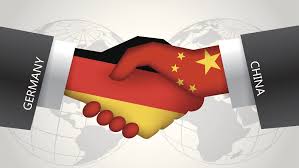Closer China-Germany cooperation amid global uncertainties

Beijing: Days before German Chancellor Angela Merkel’s official visit to China starting on Friday, Berlin greeted a pair of new-born twin panda cubs.
The twins’ mother Meng Meng arrived at Zoo Berlin ahead of Chinese President Xi Jinping’s state visit to the country in 2017 for a conservation and breeding research program for the endangered species. The birth of the baby pandas shows that bilateral cooperation is bearing new and precious fruit.Merkel is traveling to Beijing at a time when more of such productive cooperation between the world’s two major economies is much needed against the backdrop of global uncertainties.
Across the world, trade protectionism and economic nationalism are rearing their ugly heads, the existing global free trade system is lurching, a no-deal Brexit is looming and the global economy is slowing down. These tumultuous circumstances offer the two sides good reasons to join forces and work even closer together.
Over the past years, the two sides have enjoyed steady and vibrant mutually beneficial cooperation in many areas, including trade and investment in particular.
According to Germany’s Federal Statistical Office, bilateral trade between China and Germany reached nearly 200 billion euros (220.4 billion U.S. dollars) in 2018, making China Germany’s top trading partner for the third consecutive year.
During the same year, Germany exported goods worth 93.1 billion euros (around 103 billion dollars) to China, making it the third-largest buyer of German products, while China accounted for the largest share of imports into Germany with goods worth 106.2 billion euros (117.4 billion dollars).
Statistics show that China and Germany are complementary partners in trade, and their cooperation potential remains huge.
Right now, the German economy, which relies chiefly on exporting products ranging from Mercedes limousines to Siemens X-ray machines, is showing signs of recession.
There is an urgent need for Germany and China to safeguard an open global economy and ensure that normal international trade should not be disrupted by protectionist tariffs.
China has one of the world’s largest consumer markets. Despite rising protectionism, Beijing is determined and rolling out a raft of reform measures to further open up its market.
As Merkel embarks on her 12th trip to China as German chancellor, she is accompanied by a large delegation of German CEOs, and is also going to visit Wuhan, a major transport hub in Central China which is home to emerging hi-tech industries and prestigious Chinese universities. The visit offers an important chance for the two sides to strengthen their cooperation in driverless cars, intelligent manufacturing and artificial intelligence.
As the two countries are seeking to consolidate their cooperation, China also values Germany’s important role in promoting Beijing’s cooperation with Brussels. A strong, united and open European Union is in China’s interests.
Apart from boosting their bilateral trade and investment cooperation, Beijing and Berlin also shoulder special responsibilities as major countries to handle some of the most pressing issues facing the international community, like combating climate change and fighting terrorism.
In today’s world where uncertainties prevail, a closer relationship between China and Germany is bound to inspire more certainty and confidence in the world’s future.





